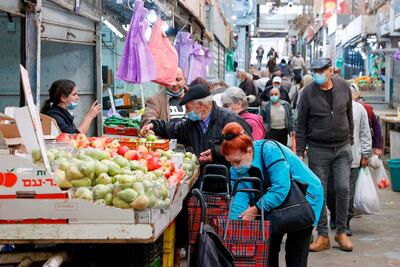Israel imposed its third nationwide lockdown on Sunday to confront a rise in coronavirus cases, with Prime Minister Benjamin Netanyahu vowing the shutdown would be the final push to overcome the pandemic.
Residents were ordered to stay at home and all non-essential stores and services were shut from 5pm, while schools will be partially closed.
“We are heading to a huge vaccine operation unlike anything in the world and I ask you at the same time to do the short and tightened lockdown,” Mr Netanyahu said on the eve of the new measures.
Although the rules have been approved for two weeks, health officials have warned they may need to be extended further to drive down the current infection rate of 4.4 per cent.
Before the new restrictions coming into force, central Jerusalem was bustling with shoppers and queues formed outside some outlets.
Serving customers in a busy book shop, Sarah Barkai described the lockdown as “unfortunately necessary” and important to save lives.
"We're almost out of this. Everyone is getting the vaccine, my parents, bless them, are getting it next week," said Ms Barkai, 44.
Over the past week more than 280,000 people have received their first coronavirus vaccine, Health Minister Yuli Edelstein said on Sunday, while officials are aiming to increase injections over the next few days.
Although shops selling essentials will stay open during the lockdown, some are expecting to take a financial hit.
“People won’t come out a lot,” said Nis Peretz, 31, working in Jerusalem’s Machane Yehuda food market. “When you sell food you can be open, but it’s not normal,” in terms of footfall, he added.
The lockdown is set to cost the economy 2.5 billion shekels ($776 million) a week, according to a Bank of Israel assessment.
Residents have been ordered to stay within a kilometre of their home, although there are exceptions such as travelling to offices which are allowed to operate at a limited capacity.
Going running, attending a circumcision or getting vaccinated are also featured on a list of reasons people can break the one-kilometre barrier without facing a fine of 500 shekels.
Israel’s latest lockdown came before it had fully emerged from the second shutdown, imposed in September when the country had one of the world’s highest infection rates.
After being praised for its handling of the pandemic in March, the government was widely criticised for its perceived mismanagement of the health crisis over the summer months.
In early May around 230 people had died from coronavirus in Israel, a figure which has now hit 3,222, out of a population of nine million.
The December measures follow Israel registering six cases of a new coronavirus variant which was initially detected in England. The emergence of the highly-infectious variant prompted Israel to order all returning travellers to quarantine in government-run hotels.
While the Israeli prime minister said an end to the health crisis is in sight, the Palestinian Authority described a “catastrophic” and worsening situation in the occupied West Bank and Gaza.
The spread of the virus in the West Bank was blamed on residents refusing to abide by a lockdown in place since mid-December, according to the PA’s health ministry spokesman, Kamal Al Shakhra, quoted by Palestinian news agency Wafa.
Some 1,083 people have died from the virus in the West Bank, home to more than three million Palestinians, while the death toll among Gaza’s two million residents stands at 323, according to World Health Organisation data.

A severe shortage of tests resulted in 32 per cent of samples coming back positive last week in Gaza, where the Hamas leadership has enforced measures to curb coronavirus.
While the Israeli government aims to be carrying out 150,000 vaccines daily within a week, there are currently no plans to offer these to Palestinians.
The PA is expected to initially gain support from the global Covax scheme, established to help developing nations vaccinate 20 per cent of their population.
"We don’t know exactly yet when vaccines will become available for distribution,” said Gerald Rockenschaub, head of WHO’s Jerusalem office. "We estimate that it could be in early to mid-2021.”


